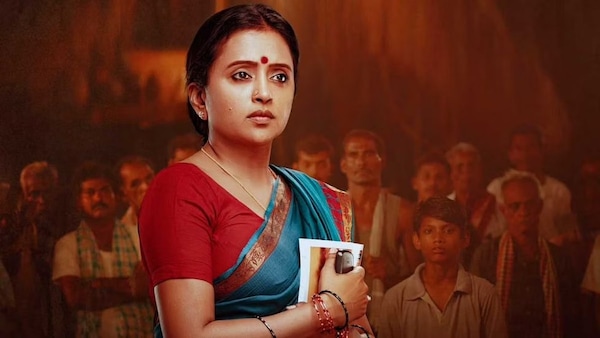Jayamma Panchayathi review: Suma is the only saving grace of this rooted yet directionless rural drama
The film is an authentic portrayal of lives in the countryside but is diluted by vague subplots that don’t add any value to the story

Last Updated: 09.00 AM, Jun 13, 2022
Story:
Jayamma and her husband are parents to two girls, leading an ordinary yet happy-go-lucky existence in the sleepy village Palakonda in Srikakulam. While her elder daughter Pushpa has just entered puberty, tragedy strikes the house when Jayamma’s husband is diagnosed with a serious heart ailment. Using the donations her daughter would receive from the invitees to the puberty function, Jayamma plans to fund her husband's treatment. However, when she realises that the sum collected from the function is too petty to go ahead with the treatment, she wages a lone battle against the elderly men in the village for justice.
Review:
It's one thing to showcase an authentic portrait of life in the countryside and another thing to tell a good story. If Jayamma Panchayathi was publicised as a documentary about a sleepy town in Srikakulam, you have a reason to watch it. However, if you expect an intriguing rural drama headlined by someone as capable as Suma Kanakala, the film is a crushing disappointment. Every village has its share of eccentricities and quirks and it takes a good storyteller to bind those threads and structure an engaging narrative - which is what Jayamma Panchayathi lacks. One can play safe by calling this an honest attempt, but the reality is that it's a waste of a great opportunity.
Jayamma Panchayathi is a what you get when a story's core conflict and the resolution are vague - the narrative is too happy to amble along sans purpose. There's a priest at a temple who spends most of his time on the mobile even while doing pujas and even plays cards when he's free. Another well-knowledged Dalit hides his identity as a Brahmin to be a priest at another temple. Every villager contributes a specific amount to a family whenever there's an auspicious event in their household. An elderly man who's rumoured to perform black magic is ostracised from society. The film's narrative is just that; it tries to tell you everything about the village and doesn't focus on anything in adequate detail.
The (largely non-existent) story has a near-implausible premise (if it isn't interpreted rightly) - the challenge for the filmmaker is to make the viewer root for Jayamma (despite her unreasonable demands) and invest in her plight. This never happens because one never empathises with Jayamma's fight and there's very little emotional connect. There are two other love stories progressing simultaneously (one involving teenagers and the other revolving around youngsters in their 20s) and the narrative consistently keeps jumping from one subplot to the other and it's easy to lose track of the proceedings.
The first hour at least gives you the space to absorb this world but the second half digresses from the plot beyond imagination. Suddenly the elderly men who resolve issues within the village are arrested and spend their time at the police station and Jayamma's fight for her husband takes a backseat. It's also surprising to see how Jayamma's husband in the film hardly has any identity - never do you experience a lump in your throat about his precarious health condition. The story of the Dalit priest, the love tale of his daughter and the man rumoured to be performing black magic are partially interesting though the narrative is too distracted and unsure of what subplot to focus on at what moment.
The writer-director Vijay Kumar Kalivarapu's major victory with the film is how he retains the rawness of the village ambience on the screen and also of the various characters that inhabit this world. The major mistake he commits is with the cluttered narrative and the excessive collation of influences from his surroundings (the naxal scene before the climax is the final nail in the coffin) that suffocates the viewer. Had the film focused more on the Dailt priest angle, the complications in his daughter's love story and less on Jayamma, the narrative would've been more absorbing. The drama never soars in Jayamma Panchayathi and this is a script that had potential- just that it needed more redrafting.
Suma is terrific as a rural woman who could go to any length to safeguard her family though it's safe to say that the script doesn't make the best use of her abilities. Devi Prasad, like every other film, hams beyond necessity. Dinesh Kumar and Shalini make for a good on-screen pair and their subplot has enough meat to become the source material for a standalone feature film. Mayanand Thakur gets quite an intriguing role, having to express himself without dialogue (and more through his stares, body language) and he responds to the challenge well. MM Keeravaani's album, despite boasting of good tracks, doesn't create the desired impact on the screen. The Palakonda backdrop is a sight for sore eyes while the editing is slightly all over the place and the storytelling lacks focus.
Verdict:
Jayamma Panchayathi is a disappointment. The story's potential isn't utilised to its fullest capacity and it's hard to find a silver lining in the film beyond Suma's terrific screen presence and flawless dialogue delivery. Suma deserved a better big-screen comeback than this!
Subscribe to our newsletter for top content, delivered fast.
